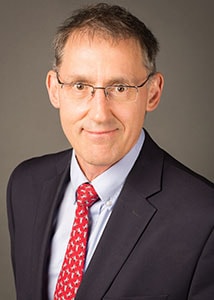
Conrad Ciccotello
Each week, Daniels is featuring a researcher who conducts meaningful research that impacts their field and the wider community. Learn more about their work in Q&As with the Daniels Research team and email them to nominate yourself or a colleague for a future Q&A.
Conrad S. Ciccotello is the director of the Reiman School of Finance. He previously chaired the Department of Risk and Insurance at Georgia State University and led their Asset and Wealth Management Programs. Ciccotello earned his PhD in finance from Penn State University and holds a JD from Suffolk Law School. His research focuses on capital markets, financial services, and intermediaries. He has over 60 publications and has received grants from prestigious institutions like TIAA Institute, William Davidson Institute and Kauffman Foundation. Ciccotello is currently a research fellow at the TIAA Institute, co-editor of the Financial Planning Review and a senior consultant at Charles River Associates. He has served as an investment committee member for the University System of Georgia defined contribution retirement plan and as an executive director for two foundations that promote financial services education. Ciccotello has also served in roles such as lead independent director, audit committee chair and nominating/corporate governance chair on public company boards over the last 20 years.
What have you studied over the course of your career?
My research reflects my interests and educational background in law, finance and engineering, as well as my project management experiences with complex systems. I am primarily interested in how markets and financial institutions are designed and how they work (or fail) under different types of conditions. I’ve focused on how managerial, organizational and legal considerations relate to financial outcomes. Financial outcomes are obviously important, but how can we relate those to factors such as organizational structure, managerial or board characteristics, or changes in laws?
What have you been studying recently?
Lately, I have been studying how financial institutions can achieve both financial and social impact goals. For example, together with my coauthors Tony Annan from Georgetown and Felix Rioja from Tulane, we have examined microfinance institutions, which are entities in emerging markets that aim to help lift people out of poverty with small loans. We published a 2024 paper in the International Review of Financial Analysis that uses a global sample of microfinance institutions to examine how funding sources impact microfinance institutions’ achievement of social and financial goals. We looked at equity, bonds, donations, etc., and what we found was that the impact of the funding source depends on where the institution is in its lifecycle. We also observe that having a higher proportion of equity capital funding can help to achieve both social and financial goals.
Can you talk about your work with PhD students?
One of the benefits of working with the Executive PhD program at Daniels is having the opportunity to collaborate with outstanding students. Our students often have extensive professional experience and valuable industry connections that can lead to novel data access and collection. I’ve been working with executive-type doctoral programs for nearly two decades (at Daniels and Georgia State) in part because of the students’ ability to bring in insightful research questions, fresh ideas, new methods and novel data. I learn a lot from working with these doctoral students.
How would you like to see your work impact the world?
I strongly believe in sharing my research outside academia. I don’t think that academic research should be published and then put on a shelf. Throughout my career my work has been cited in Senate Banking Committee testimony, quoted in the Federal Register, and discussed in media outlets like the New York Times, Wall Street Journal and Washington Post. I’ve even been interviewed in media outlets like the Weather Channel and Men’s Health Live, where my research on personal financial planning was the topic. This is all to say that I really believe in disseminating my academic research. When I was a doctoral student at Penn State, this is how we were taught: publish an academic paper and then share the insights in the classroom and beyond.
